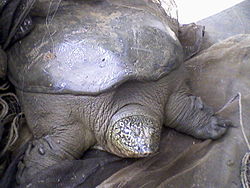| Rafetus Temporal range: [1] | |
|---|---|
 | |
| Rafetus swinhoei in Hanoi, Vietnam | |
 | |
| Rafetus euphraticus | |
| Scientific classification | |
| Kingdom: | Animalia |
| Phylum: | Chordata |
| Class: | Reptilia |
| Order: | Testudines |
| Suborder: | Cryptodira |
| Family: | Trionychidae |
| Subfamily: | Trionychinae |
| Genus: | Rafetus Gray, 1864 |
| Type species | |
| Testudo euphratica Daudin, 1801 | |
| Species | |
| |
Rafetus is a genus of highly endangered softshell turtles in the family Trionychidae. It is a genus of large turtles which are found in freshwater habitats in Eurasia.

